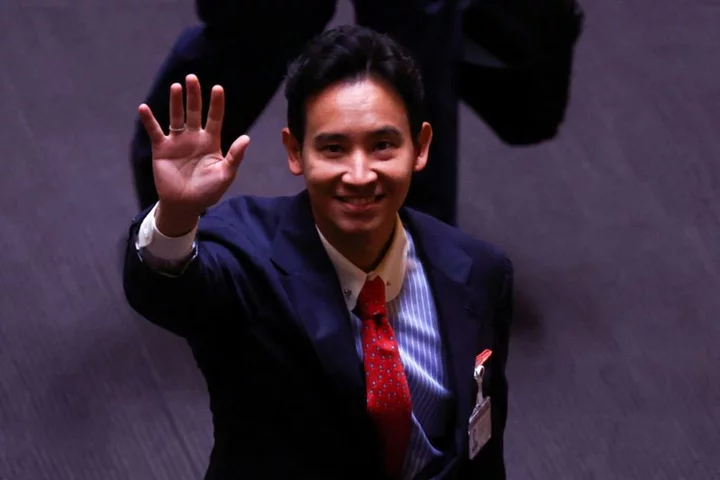By Devjyot Ghoshal and Panu Wongcha-um
BANGKOK In the 60 days since a stunning election victory, the leader of Thailand's Move Forward party forged and managed a coalition, cajoled the royalist military establishment and rallied his troops with a single goal - to become prime minister.
On Thursday, 42-year-old Pita Limjaroenrat failed in his initial bid to win the premiership after he was unable to secure enough votes in a joint sitting of Thailand's 750-member parliament. Another vote is expected to be held next week, which Pita can contest if nominated again.
The setback came despite Move Forward's victory in the May general election, where it emerged the single largest party after running a slick, social-media powered campaign that promised progressive, transparent government to Thai voters.
But Pita and Move Forward's agenda - particularly a once-unthinkable proposal to amend Thailand's "lese majeste" law - also pit them against the country's powerful conservative establishment, which controls the 250-member appointed senate.
"Give Thailand the opportunity to have a majority government according to the will of the people," he said in a video message on Tuesday, reiterating a call to elected and unelected lawmakers to support him in the bicameral vote.
"I can be a prime minister who runs a country that embraces everybody's diverse dreams," he said.
Yet, by Wednesday afternoon - less than a day before the vote - Pita's quest for power was hit by a double-whammy.
First, Thailand's election commission recommended the Constitutional Court disqualify Pita as a lawmaker because of his ownership of shares in a media company in violation of electoral rules.
Second, the Constitutional Court said it had accepted a complaint against Pita and his party over plans to amend the lese majeste law, Article 112 of the criminal code that punishes insulting the monarchy with up to 15 years in prison.
The actions were a throwback to 2020, when a court ordered the predecessor party of Move Forward dissolved and some of its leaders banned from politics for a decade for violations of election rules.
It was into that breach that Pita - then a first-term lawmaker from a politically influential family with experience working in the technology sector - stepped, becoming the leader of the newly-formed Move Forward.
The position foisted the Harvard University graduate on to the centre stage of Thai politics, which was roiled by a youth-led reformist movement that saw thousands take to the streets, sometimes leading to violent clashes in the heart of Bangkok.
The young protesters took on the military-backed rulers head on, calling for deep-seated reforms, a new constitution and questioning the monarchy's long-held influence on politics and society.
Some of those protesters - and some of those demands - were part of Move Forward's electoral juggernaut, including a call to amend the lese majeste law.
'ABLE TO COMPROMISE'
In a country where many consider the monarch semi-divine, analysts doubted whether a Pita-led Move Forward would be able to push aside a raft of conservative and pro-establishment parties that had dominated domestic politics for over a decade.
At the hustings, Pita drew large, adoring crowds - many of them young voters. The party's trademark orange logo and sharp messaging flooded social media. Late in the campaign, the first-time prime ministerial candidate saw a surge in popularity.
"Vote for Move Forward to change this country together," Pita said in a slick campaign video, taking off a pair of sunglasses and winking.
To millions of Thais weary of an almost decade-long military-backed rule, Pita offered an raft of changes, including increase in minimum wages, dismantling of business monopolies, streamlining of the armed forces and legalising same-sex marriage.
When the numbers rolled in late on May 14, Move Forward not only trounced the ruling coalition but also bettered the populist Pheu Thai Party - the opposition outfit backed by self-exiled tycoon Thaksin Shinawatra, a former prime minister.
The outcome pushed Pita to switch gears from candidate to coalition builder, as a group of seven parties - including the Pheu Thai - coalesced around Move Forward to win power.
"Pita is a democratic representative who can elevate Thailand on the global stage in a dignified way," said Kannawee Suebsang, a member of parliament from the Fair Party, which is part of Pita's eight party-coalition.
"He is a strong leader with charisma but is also able to compromise."
(Reporting by Devjyot Ghoshal and Panu Wongcha-um; Editing by Nick Macfie)

